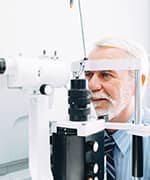Life Extension Magazine.
As we age, conditions like cataracts, glaucoma, and macular degeneration threaten our vision.1
Scientists long ago discovered that carotenoids like lutein and zeaxanthin concentrate in the macula of the eye, where they help filter out damaging wavelengths of light.2-4
What few people know is these same carotenoids have also been shown to help protect the eye lens against cataracts and the optic nerve from glaucoma damage.5-8
Published studies continue to demonstrate whole-body benefits in those who ingest these plant-derived carotenoids.
Carotenoids and Systemic Health
Carotenoids are a group of pigments found in many fruits and vegetables. They have demonstrated benefits in tissues throughout the body, including the brain.7-9
Taken up and concentrated in brain tissues, carotenoids have been found to be neuroprotective and supportive of cognitive function.8
Individuals with higher levels or higher intake of carotenoids have consistently been found to have better cognitive performance.10-13
A systematic review and meta-analysis found consistently lower blood levels of lutein and zeaxanthin in people diagnosed with Alzheimer’s compared to healthy adults of the same age.14
Randomized clinical trials have also found significant improvements in cognitive functioning in those receiving a carotenoid supplement compared to those receiving a placebo.15,16
Those with high dietary intake of lutein and zeaxanthin have lower risk for eye disease and vision loss.
Modern Western diets rarely provide enough carotenoids.17 Average lutein intake is low for adults.18
Oral intake of lutein-zeaxanthin supplements has been shown to boost the content of carotenoid pigments in the eyes and may improve whole-body health.19,20
Cataracts
Cataracts are a common degenerative disease that clouds the lens of the eye. The result is deteriorating vision and eventual blindness.
Cataracts are one of the most important leading causes of blindness in the world.6 In modern societies, cataract surgery is rampant in people over age 65.
Studies show that people with the highest intake of lutein and zeaxanthin have the lowest rates of cataracts, age-related macular degeneration, and other age-related eye conditions.5,21,22
Glaucoma
In those with glaucoma, higher intake of lutein protects the photoreceptors and nerve cells of the retina against cell death. The result is less progression of visual loss and improved visual performance.22
Studies have demonstrated that a larger dietary intake of carotenoids is associated with a lower risk of glaucoma.22 In individuals already suffering from glaucoma, higher carotenoid levels in the retina consistently predict better visual performance.
Randomized controlled trials of carotenoid supplementation in patients with glaucoma demonstrate that they are effective at both boosting retinal levels of the nutrients and improving markers of visual function.23,24
Those with glaucoma should also follow conventional guidelines including taking steps to reduce intraocular pressure that slowly damages the optic nerve.
Macular Degeneration
When blue light and ultraviolet light hit the retina, they can damage photoreceptors, the cells that detect light.2,25 Without photoreceptors, vision is not possible.26
Exposure to blue light is tied to an increased risk of age-related macular degeneration, the leading cause of severe vision loss and blindness in people over 60.26
Oxidative stress and inflammation further drive the progression of macular degeneration.2
Lutein and zeaxanthin in the retina defend against macular degeneration in multiple ways. They filter out harmful wavelengths of light and are potent anti-oxidants and anti-inflammatories.2,4
One study conducted over more than 20 years found that people with the highest intake of lutein and zeaxanthin have a remarkable 41% lower risk of advanced macular degeneration.27
Taking lutein and zeaxanthin doesn’t just prevent macular degeneration. It may also reverse some visual loss that has occurred.28
Clinical studies show that oral intake of these carotenoids may slow the progression of macular degeneration in those who already have early signs of disease,3,21,28-31 and may also support visual acuity (the ability to see sharply at a given distance).28
Other studies show that taking lutein and zeaxanthin improves eye health, enhances visual function, reduces nighttime glare, and improves visual contrast.19,32-34
In one recent trial, older adults who had difficulty with night vision took a placebo or a blend of zeaxanthin and lutein daily for six months.35 Those taking the carotenoids had significant improvements in nighttime visual functions.
Digital Eye Strain
Threats to our eyes are all around us, from ultraviolet rays in sunlight to the blue light from our digital screens.
Gazing at smart phones, computers, tablets, LED televisions, and other digital screens increases exposure to blue light, which contributes to eye disease and vision loss.25,26,36 The LED lightbulbs in most of our homes and workplaces also emit a high level of blue light.36
In addition to the long-term risk of vision loss, blue light is tied to digital eye strain, which causes symptoms like eye pain, dry eyes, headache, and blurred vision.37
The retina and macula are light-sensitive eye tissues that make vision possible. When the carotenoids lutein and zeaxanthin are orally ingested, they are taken up in these eye tissues where they help shield against harmful forms of light, including ultraviolet and blue light.2,38,39
The carotenoids lutein and zeaxanthin help shield the eyes from harmful blue light wavelengths, which can help protect against eye strain and vision loss.28
Retinopathy
Diabetic retinopathy is another cause of poor eyesight in older adults. Carotenoids protect against this condition as well.
In patients with diabetic retinopathy, body levels of lutein and zeaxanthin are typically lower than in normal subjects. Oral intake of these carotenoids has been shown to improve visual clarity and contrast in those displaying symptoms of diabetic eye disease.40
Ensuring adequate intake of lutein and zeaxanthin is vital for eye health at any age.18
Summary
In eye tissues, the carotenoids lutein and zeaxanthin help filter out harmful wavelengths of light that lead to vision loss.
These nutrients defend against most age-related eye disorders and the damage done by exposure to blue light from digital screens.
Studies long ago showed that higher intake of lutein and zeaxanthin boosts macular pigment density and reduce risk for vision loss from macular degeneration.
More recent data show these same carotenoids also help protect against cataracts, glaucoma-induced damage to the optic nerve, and diabetic eye disorders.
Evidence indicates that supplementing with carotenoids is supportive of optimal brain and cognitive function.
What you need to know
Shield Your Eyes with Carotenoids
- Age-related loss of vision is commonly caused by cataracts, age-related macular degeneration, glaucoma, and diabetes.
- Exposure to blue light from digital screens and LED lights can accelerate loss of vision and cause eye strain.
- The eye is capable of concentrating carotenoids, particularly lutein and zeaxanthin, in the retina and macula—its light-sensitive tissues—to shield against dangerous ultraviolet and blue light.
- Studies show that oral intake of lutein and zeaxanthin can reduce the risk and slow the progression of all these age-related eye conditions. These nutrients have the potential to prevent degenerative vision loss, improve visual parameters in those with age-related degenerative eye conditions, and to delay progression of these conditions and the worsening of vision associated with them.
If you have any questions on the scientific content of this article, please call a Life Extension Wellness Specialist at 1-866-864-3027.
References
- Pelletier AL, Rojas-Roldan L, Coffin J. Vision Loss in Older Adults. Am Fam Physician. 2016 Aug 1;94(3):219-26.
- Bian Q, Gao S, Zhou J, et al. Lutein and zeaxanthin supplementation reduces photooxidative damage and modulates the expression of inflammation-related genes in retinal pigment epithelial cells. Free Radic Biol Med. 2012 Sep 15;53(6):1298-307.
- Huang YM, Dou HL, Huang FF, et al. Effect of supplemental lutein and zeaxanthin on serum, macular pigmentation, and visual performance in patients with early age-related macular degeneration. Biomed Res Int. 2015;2015:564738.
- Kijlstra A, Tian Y, Kelly ER, et al. Lutein: more than just a filter for blue light. Prog Retin Eye Res. 2012 Jul;31(4):303-15.
- Ma L, Hao ZX, Liu RR, et al. A dose-response meta-analysis of dietary lutein and zeaxanthin intake in relation to risk of age-related cataract. Graefes Arch Clin Exp Ophthalmol. 2014 Jan;252(1):63-70.
- Manayi A, Abdollahi M, Raman T, et al. Lutein and cataract: from bench to bedside. Crit Rev Biotechnol. 2016 Oct;36(5):829-39.
- Ames BN. Prolonging healthy aging: Longevity vitamins and proteins. Proc Natl Acad Sci U S A. 2018 Oct 23;115(43):10836-44.
- Tan BL, Norhaizan ME. Carotenoids: How Effective Are They to Prevent Age-Related Diseases? Molecules. 2019 May 9;24(9).
- Eggersdorfer M, Wyss A. Carotenoids in human nutrition and health. Arch Biochem Biophys. 2018 Aug 15;652:18-26.
- Christensen K, Gleason CE, Mares JA. Dietary carotenoids and cognitive function among US adults, NHANES 2011-2014. Nutr Neurosci. 2020 Jul;23(7):554-62.
- Feeney J, Finucane C, Savva GM, et al. Low macular pigment optical density is associated with lower cognitive performance in a large, population-based sample of older adults. Neurobiol Aging. 2013 Nov;34(11):2449-56.
- Renzi LM, Dengler MJ, Puente A, et al. Relationships between macular pigment optical density and cognitive function in unimpaired and mildly cognitively impaired older adults. Neurobiol Aging. 2014 Jul;35(7):1695-9.
- Vishwanathan R, Iannaccone A, Scott TM, et al. Macular pigment optical density is related to cognitive function in older people. Age Ageing. 2014 Mar;43(2):271-5.
- Qu M, Shi H, Wang K, et al. The Associations of Plasma/Serum Carotenoids with Alzheimer’s Disease: A Systematic Review and Meta-Analysis. J Alzheimers Dis. 2021;82(3):1055-66.
- Davinelli S, Ali S, Solfrizzi V, et al. Carotenoids and Cognitive Outcomes: A Meta-Analysis of Randomized Intervention Trials. Antioxidants (Basel). 2021 Feb 2;10(2).
- Hammond BR, Jr., Miller LS, Bello MO, et al. Effects of Lutein/Zeaxanthin Supplementation on the Cognitive Function of Community Dwelling Older Adults: A Randomized, Double-Masked, Placebo-Controlled Trial. Front Aging Neurosci. 2017;9:254.
- Hendrickson SJ, Willett WC, Rosner BA, et al. Food predictors of plasma carotenoids. Nutrients. 2013 Oct 11;5(10):4051-66.
- Stringham JM, Johnson EJ, Hammond BR. Lutein across the Lifespan: From Childhood Cognitive Performance to the Aging Eye and Brain. Curr Dev Nutr. 2019 Jul;3(7):nzz066.
- Stringham JM, Stringham NT. Serum and retinal responses to three different doses of macular carotenoids over 12 weeks of supplementation. Exp Eye Res. 2016 Oct;151:1-8.
- Wilson LM, Tharmarajah S, Jia Y, et al. The Effect of Lutein/Zeaxanthin Intake on Human Macular Pigment Optical Density: A Systematic Review and Meta-Analysis. Adv Nutr. 2021 Dec 1;12(6):2244-54.
- Lem DW, Davey PG, Gierhart DL, et al. A Systematic Review of Carotenoids in the Management of Age-Related Macular Degeneration. Antioxidants (Basel). 2021 Aug 5;10(8).
- Lem DW, Gierhart DL, Davey PG. Carotenoids in the Management of Glaucoma: A Systematic Review of the Evidence. Nutrients. 2021 Jun 6;13(6).
- Hunter AML, Loskutova E, Lingham G, et al. ARVO Annual Meeting Abstract. Higher macular pigment levels are associated with better contrast sensitivity and photostress recovery time in patients with open-angle glaucoma supplemented with carotenoids. Invest Ophthalmol Vis Sci. 2022;63(2699-A0063).
- Loughman J, Loskutova E, Butler JS, et al. Macular Pigment Response to Lutein, Zeaxanthin, and Meso-zeaxanthin Supplementation in Open-Angle Glaucoma: A Randomized Controlled Trial. Ophthalmol Sci. 2021 Sep;1(3):100039.
- Alaimo A, Linares GG, Bujjamer JM, et al. Toxicity of blue led light and A2E is associated to mitochondrial dynamics impairment in ARPE-19 cells: implications for age-related macular degeneration. Arch Toxicol. 2019 May;93(5):1401-15.
- Algvere PV, Marshall J, Seregard S. Age-related maculopathy and the impact of blue light hazard. Acta Ophthalmol Scand. 2006 Feb;84(1):4-15.
- Wu J, Cho E, Willett WC, et al. Intakes of Lutein, Zeaxanthin, and Other Carotenoids and Age-Related Macular Degeneration During 2 Decades of Prospective Follow-up. JAMA Ophthalmol. 2015 Dec;133(12):1415-24.
- Liu R, Wang T, Zhang B, et al. Lutein and zeaxanthin supplementation and association with visual function in age-related macular degeneration. Invest Ophthalmol Vis Sci. 2014 Dec 16;56(1):252-8.
- Berrow EJ, Bartlett HE, Eperjesi F. The effect of nutritional supplementation on the multifocal electroretinogram in healthy eyes. Doc Ophthalmol. 2016 Apr;132(2):123-35.
- Huang YM, Dou HL, Huang FF, et al. Changes following supplementation with lutein and zeaxanthin in retinal function in eyes with early age-related macular degeneration: a randomised, double-blind, placebo-controlled trial. Br J Ophthalmol. 2015 Mar;99(3):371-5.
- Ma L, Dou HL, Huang YM, et al. Improvement of retinal function in early age-related macular degeneration after lutein and zeaxanthin supplementation: a randomized, double-masked, placebo-controlled trial. Am J Ophthalmol. 2012 Oct;154(4):625-34 e1.
- Nolan JM, Power R, Stringham J, et al. Enrichment of Macular Pigment Enhances Contrast Sensitivity in Subjects Free of Retinal Disease: Central Retinal Enrichment Supplementation Trials - Report 1. Invest Ophthalmol Vis Sci. 2016 Jun 1;57(7):3429-39.
- Stringham JM, O’Brien KJ, Stringham NT. Macular carotenoid supplementation improves disability glare performance and dynamics of photostress recovery. Eye Vis (Lond). 2016;3:30.
- Machida N, Kosehira M, Kitaichi N. Clinical Effects of Dietary Supplementation of Lutein with High Bio-Accessibility on Macular Pigment Optical Density and Contrast Sensitivity: A Randomized Double-Blind Placebo-Controlled Parallel-Group Comparison Trial. Nutrients. 2020 Sep 28;12(10).
- Richer S, Novil S, Gullett T, et al. Night Vision and Carotenoids (NVC): A Randomized Placebo Controlled Clinical Trial on Effects of Carotenoid Supplementation on Night Vision in Older Adults. Nutrients. 2021 Sep 14;13(9).
- Available at: https://www.reviewsce.com/ce/the-lowdown-on-blue-light-good-vs-bad-and-its-connection-to-amd-109744. Accessed October 13, 2022,
- Available at: https://thevisioncouncil.org/blog/vision-council-shines-light-protecting-sight-and-health-multi-screen-era. Accessed October 13, 2022,
- Xue C, Rosen R, Jordan A, et al. Management of Ocular Diseases Using Lutein and Zeaxanthin: What Have We Learned from Experimental Animal Studies? J Ophthalmol. 2015;2015:523027.
- Loskutova E, Nolan J, Howard A, et al. Macular pigment and its contribution to vision. Nutrients. 2013 May 29;5(6):1962-9.
- Hu BJ, Hu YN, Lin S, et al. Application of Lutein and Zeaxanthin in nonproliferative diabetic retinopathy. Int J Ophthalmol. 2011;4(3):303-6.
- Cort A, Ozturk N, Akpinar D, et al. Suppressive effect of astaxanthin on retinal injury induced by elevated intraocular pressure. Regul Toxicol Pharmacol. 2010 Oct;58(1):121-30.
- Kidd P. Astaxanthin, cell membrane nutrient with diverse clinical benefits and anti-aging potential. Altern Med Rev. 2011 Dec;16(4):355-64.
- Fernandez-Albarral JA, de Hoz R, Ramirez AI, et al. Beneficial effects of saffron (Crocus sativus L.) in ocular pathologies, particularly neurodegenerative retinal diseases. Neural Regen Res. 2020 Aug;15(8):1408-16.
- Heitmar R, Brown J, Kyrou I. Saffron (Crocus sativus L.) in Ocular Diseases: A Narrative Review of the Existing Evidence from Clinical Studies. Nutrients. 2019 Mar 18;11(3).
- Li X, Sun M, Long Y. Cyanidin-3-O-Glucoside Attenuates Lipopolysaccharide-Induced Inflammation in Human Corneal Epithelial Cells by Inducing Let-7b-5p-Mediated HMGA2/PI3K/Akt Pathway. Inflammation. 2020 Jun;43(3):1088-96.
- Nakaishi H, Matsumoto H, Tominaga S, et al. Effects of black current anthocyanoside intake on dark adaptation and VDT work-induced transient refractive alteration in healthy humans. Altern Med Rev. 2000 Dec;5(6):553-62.
- Pawlowska E, Szczepanska J, Koskela A, et al. Dietary Polyphenols in Age-Related Macular Degeneration: Protection against Oxidative Stress and Beyond. Oxid Med Cell Longev. 2019;2019:9682318.





